by Jenny Rose | Apr 5, 2018 | A Flourishing Woman, Body, Food
I posted three times about diet and food in 2017. You can find them here, here and here. They are among my most-read posts, and I’ve had enough comments and reads to encourage me to update my experience a year later. I still read everything I see regarding food, nutrition and diet, and I’m still learning what choices give me optimal health and following new science and data.

Photo by freddie marriage on Unsplash
For the record, I’m 54 years old, officially in menopause now, 5 feet 8 inches tall and a steady 140 lbs. I do a minimum of two hours of sweat-producing Tai Chi a week, swim laps for 45-60 minutes without stopping weekly, and walk energetically up and down a steep hill with my partner (about 50 minutes) five days a week. This walk is also sweat-producing. I dance occasionally and take shorter walks and snowshoe excursions several times a week. I go up and down steep flights of stairs all day long, shovel snow and help hump hardwood (heavy!) firewood into the barn. My blood pressure and pulse are both low, and my BMI is exactly where it’s supposed to be. I see a dentist and eye doctor regularly and a medical doctor rarely. I take no prescription medications and I don’t drink or smoke. I sleep 8-9 hours a night.

Photo by Tanja Heffner on Unsplash
In the summer of 2016, as I was slowly eating fewer and fewer plants and more and more meat and animal fats, I had trouble with hair loss. It occurred about six months into my transition to a very low-carb, high-fat diet. As you can imagine, it gave me pause. My hair is one of my few vanities (it misbehaves so gloriously!) and the women in my family have thick, healthy hair. I freaked out.
My first thought was thyroid. I was previously diagnosed as hypothyroid, but I had quit taking my medication when I moved to Maine in 2015 and had no further symptoms. I went to a doctor and had blood drawn. My thyroid levels were normal. Good news, but it didn’t explain my hair loss. At that particular time I was under a great deal of family stress, and the doctor assured me my hair loss was a stress reaction combined with menopause. I wasn’t much comforted, but I couldn’t find another explanation and he was undisturbed, so I decided to give it some time and see what happened.
The stress in my personal life resolved and after three or four weeks so did the hair loss. I didn’t think any more about it until recently, when my partner, who also eats low-carb, high-fat, told me he’d come across a blog post about temporary hair loss being a side effect of transitioning to a ketogenic diet, and it generally occurs around six months into the diet. Hair loss explained. It’s worth noting that since then, my hair is thicker, wilder and curlier than ever, and it grows fast. I need a cut at least every five weeks.

Photo by Amy Reed on Unsplash
In my old life, when I was eating a mostly plant-based diet, I really struggled with constipation. I took fiber supplements and ate loads of fiber-rich foods every day, but it seemed like the more fiber I took, the more trouble I had. I also had a lot of bloating and water retention, which was discouraging. I felt fat, and at the same time I felt depleted.
One of my biggest concerns about trying a low-carb diet was the issue of fiber. Everything I’d ever read told me unequivocally that it’s necessary to eat fiber to maintain a healthy GI tract, and cutting out plant-based food seemed to be going in the opposite direction.
What I discovered was that I still struggled with constipation, but it didn’t get worse. I was surprised, but I still wanted to fix the problem. I did a lot of reading on blogs about eating low or zero carb, and found constipation was a concern for many people. Everything I read pointed to focusing on micronutrients, especially when transitioning to low-carb, high-fat eating. I read a lot about electrolytes: salt, magnesium, calcium and potassium. My plant-based diet was low-salt (I was careful about salt and rarely added it when cooking and baking) and high in magnesium and potassium. My understanding was that salt is very bad for us, and causes high blood pressure, water retention and a myriad of other problems. Further reading informed me salt is a necessary nutrient, and I realized I was getting well below the recommended levels of salt, potassium and magnesium in my diet of meat and fat.
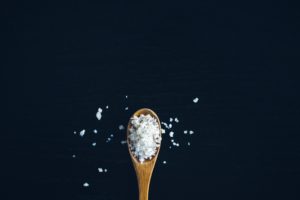
Photo by Jason Tuinstra on Unsplash
I began to supplement magnesium and potassium, and I stopped restricting salt (which I’ve always loved). I also began making sure I drink at least 3 liters of water a day, more when it’s hot and humid. The other thing I read about consistently, and this was the hardest for me, was that one needs to eat at least a pound of meat a day, and many people aim for two. That’s a lot of meat!
When I implemented all this, my constipation went away. My blood pressure and water retention did not increase with increased salt. I never have bloating. If I have trouble now, it’s because I’ve been too sedentary, not drinking or eating enough, or I forgot my usual supplements.
When I began eating low-carb, high-fat, I also started having severe leg and foot cramps, which I’d never had before. They weren’t like my chronic pain and spasm, but in the middle of the night, without warning, my calf or foot would cramp, waking me in a hurry and making me writhe for a few seconds before it relaxed. I was concerned this was a sign that eating this way was as insane and unhealthy as most people say it is and I was starving my body of what it needed, but this, too, turned out to be a function of imbalanced electrolytes and under hydration. I haven’t had any kind of cramp since last year.
In retrospect, I wonder if both my chronic pain and spasm and my constipation had a lot to do with imbalanced electrolytes all along. It may be I’ve been chronically sodium deficient. I also believe I’ve been chronically under hydrated for most of my life. I have to really pay attention in order to get three plus liters of water a day, and I lived in Colorado, which is terribly dry, before I came to Maine. Obviously, staying well hydrated is essential to healthy bowel habits.
Another problem I had was debilitating migraine headaches that lasted for at least 24 hours and made it impossible to function. Photophobia, phonophobia, neuralgia and pounding pain had me in a dark room with an ice pack. For two or three years I had them once a month, right at the full moon. As I started eating meat and fat and reducing carbs, they gradually diminished in intensity, frequency and length. I’ve had one so far this year, and I was able to function all the way through it, albeit with discomfort.
So what, exactly, does my current diet look like?
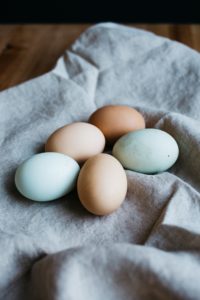
Photo by Rachael Gorjestani on Unsplash
I eat three thick slices of bacon and two sausage links with four to five buttered eggs every morning. It’s always delicious and I’m not even close to bored eating it daily. I also drink my first liter of water in unsweetened green tea and just plain water with breakfast. Every other day I put a spoonful of fresh farm cream cheese with garlic and herbs on the eggs. We usually eat before 8:00 a.m.
I don’t think about food again until around 3:00 p.m. I write for three or four hours, exercise, do housework, run errands, etc. I usually drink a couple more cups of herbal tea and I drink at least another liter of water. Sometime mid afternoon I’ll feel hungry. My partner makes a beef stew to die for, but we don’t always have that. We always have ground beef, however, and last fall we saved money and bought half a locally-raised cow, butchered and packaged to our specifications. The meat is grass-fed and very lean. I’m sure this is what most people want, but we find it too lean. Because of that, I make a burger patty or crumble and cook the beef in the frying pan from breakfast in order to take advantage of the bacon and sausage fat. The lean ground beef soaks up the fat pretty well, especially if I just crumble and cook it, which takes about 2 minutes. I aim to cook at least 3/4 of a pound of burger.
I find this extremely filling and satisfying. I drink a lot of water with it. Now and then I spoon garlic and herb farm cheese on top. If I’m really starving or feel extra depleted, I bake a half a sweet potato or white potato, anoint it with lots of butter and fresh farm sour cream. I don’t eat any kind of carb without eating fat and meat first.
I also buy unsweetened, full-fat farm yoghurt, and sometimes after my afternoon meal I’ll eat a couple big spoonfuls of that. When there is beef stew, I occasionally like to have a half a thin slice of locally baked wheat bread, liberally buttered, with the gravy. I love ice cream, and about once a week I eat a small bowl of hard ice cream, but only after a good meal of meat and fat. If we buy ice cream in town, I get a child’s serving in a bowl. Cones are just empty carbs, and they make me hurt. My partner likes banana bread, and he occasionally bakes a very low-sugar version. Sometimes I’ll eat a half a thin slice, thickly buttered, as a treat after my afternoon meal.
I have a tendency to react badly to nuts, but I love peanut butter, and we buy nothing-added-but-salt peanut butter from East Wind in bulk. Once a week I eat a spoonful of that on a small square of buttered bread.
Oddly, I’ve discovered eating one spoonful of ice cream a day causes far more problems than having a small serving once a week. For me, there seems to be a cumulative effect in terms of carbs. Now and then I splurge on a carb, just for fun, and if I’ve eaten meat and fat first I can get away with it without too many consequences. If I squirt a little catsup on my burger three days in a row, though, I’m going to start to have pain that limits my activity level and sleep. Commercial catsup, for some stupid reason, is sweetened.
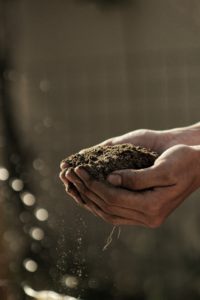
Photo by Gabriel Jimenez on Unsplash
Since I last wrote about food, I’ve done a lot of reading on permaculture, holistic food production, and land management. Please see my Resource page for links. What I’ve learned is that monocropping is biocide. Large-scale animal production can be equally catastrophic for the land and environment. What we know now is that a healthy complex system (i.e., Planet Earth, left undisturbed) contains an essential mix of plants, fungi, microorganisms, insects and animals. Earth is evolved for such communities, and we will destroy the planet if we don’t figure out how to emulate, nurture, protect and participate in such systems. All life will starve to death.
The most extraordinary thing about eating this way, and the hardest part to communicate to someone who doesn’t, is the level of hunger satisfaction. Previously, I was always snacking. A piece of fruit, a couple of pieces of toast, a salad, a smoothie. I was always hungry, and I was always ashamed of it. My shame caused me to withhold food from myself, which only made my cravings worse. My weight, mood and energy fluctuated wildly. My sleep was bad. I had constant pain. I was always thinking about food, one way or another.
It’s hard to express how different it is to eat a big breakfast and walk away feeling really satisfied and full until six or seven hours later. No craving. No shame. No snacking. No sense of deprivation. No counting calories or weighing portions. Then, another big meal, the evening routine and bedtime, satisfied and satiated. When I’m hungry, I eat. I don’t care what time it is or what else is going on. When I’m full, I stop eating. That’s it.

Photo by Erda Estremera on Unsplash
The same level of satisfaction applies to drinking water. We drink filtered water from our old hand-dug well, and I never thought just plain water could give me so much pleasure. You couldn’t pay me to drink soda or sweet tea or any of the things I used to drink. When I’m thirsty, I want water, lovely, fresh, cool, clean water. I’m never bored with it. I never want anything else. It satisfies me in a way that’s so deep it’s almost sensual.
I never feel deprived.
It’s worth noting that the absolutely most satisfying meat is beef. I eat some chicken and, occasionally, turkey, but I have to eat two or three times as much in order to get the same level of satiation, and those meats are less fatty than beef. Pork is good because it’s high-fat, and we hope to be able to buy a half a pig in the future from local farmers.
Sometimes, if I’ve been working unusually hard physically or am unusually emotionally upset, I’ll need a fast snack. In this case, hard-boiled eggs are portable, quick and healthy. Every couple of months I buy a plain ham, unsweetened, smoked, or otherwise manipulated, as fatty as I can find. I thin slice it and pack it into small baggies, which I throw in the freezer until wanted. This provides a quick, high-fat, high-salt, tasty snack I can eat on the run or in a hurry. If I’m going to visit a friend and have a cup of tea or a chat, I eat a little ham so I can have a cracker or cookie with my friend without paying for it in pain.
We have the great good fortune to be able to buy food from a farm. I no longer buy commercial milk, cheese, yoghurt, sour cream or eggs. Nothing compares to food that hasn’t left the farm until you take it home. It puts money back into the local community, fosters small-scale farmers who are working holistically with animals and plants (and they work day and night, let me assure you), and it allows me to know exactly where my food is coming from and how it’s being handled. It’s also fresh and far more delicious than anything available in the grocery store.
I’ve seen blogs and posts from people who claim to have tried a low or zero-carb, high-fat diet and say it “doesn’t work.” I’m not sure what “doesn’t work” means, exactly, but I always long to ask a lot of nosey questions. First, what was the goal? Why did they try it? Secondly, how long did they stick to it? Thirdly, did they really commit to it? Did they suspend their soda habit, stop sweetening their coffee and ditch the “healthy” granola bars? Did they eat meat and animal fat and drink water and nothing else? Lastly, do they smoke tobacco or drink? All alcohol is carbs. Do they take any prescription drugs or use recreational drugs?
Another thing I’ve heard is that eating this way is unmanageable socially. I don’t buy that. If you’re trying to change the way you eat in order to feel better and improve your health and your buddies at the bar give you a bad time for refusing nachos and cheese fries, grow a pair and tell them to back off! Better yet, get them to join you! Do a two-week challenge and bet on who will lose the most weight. True friends will support friends in maintaining health. If you can pack a sandwich for lunch, you can pack fatty ham, hard boiled eggs, and a container of full-fat unsweetened yoghurt. If your only option is fast food, buy a couple of burgers and ditch the buns and condiments. If you want to eat this way, you can. Nobody cares. Nobody’s really paying attention. They’re too busy with their own food preoccupations! Pot luck? Take a tray of cold cuts or deviled eggs. We go out to eat a couple of times a week and enjoy eggs and sausage, meatloaf, pot roast and chopped sirloin. Hold the bread, hold the side salad!
Eating in this way has transformed my life and my health. Shopping is easy, infrequent and fast. Every ten days or so I visit my friend’s farm, buy eight dozen eggs, cheese, sour cream and/or yoghurt (according to need), chat and exchange a hug. I spend a half hour in the kitchen making breakfast, doing dishes, giving the cat fresh water, looking out the windows, watching the birds and thinking about the day ahead. My afternoon meal is either already made (stew) or takes two or three minutes to cook in the breakfast frying pain. I don’t meal plan. We know exactly what we need to budget to eat well. I don’t need a lot of gear and gadgets or cupboard space. The refrigerator is not overflowing with who-knows-what leftovers and outdated food. Our collection of plastic Tupperware containers is virtually unused (which is good, because there are mice in that particular cupboard!). We don’t produce much trash, because we don’t buy cans, bags and boxes. We recycle all our egg cartons, plastic and aluminum. We compost egg shells, tea bags, coffee grounds, and any small amount of vegetable matter. Meat and bacon grease is also perfectly suitable for compost, managed properly. We know farmers who have buried a whole dead goat in the center of their compost pile with no smell and no problem.
I don’t diet. I eat food — joyously, effortlessly, with great satisfaction and pleasure. I drink water with a deep sense of gratitude that I have clean water to drink. I feel healthy, happy, energetic and filled with vitality. My body is my friend and ally, and I think it’s miraculously lovely.
Diet is a personal choice. I suspect different bodies have different requirements. Some people can’t eat eggs or dairy. Some are particularly sensitive to the herbicides in our grains. I also suspect that a lot of the current mainstream information and advice about food is skewed and misleading. I encourage everyone to research for themselves. A sampling of the links I’ve provided in these posts and on my Resource page may provide you with new information and data. Ultimately, the choice is yours, and yours alone. If you’re happy with your physical and mental health, your relationship to food and your body, and you have no need to take over-the-counter or prescription medication, you obviously have figured out what works for you. If not, it’s important to understand you’re not alone and not everyone (not even all doctors) is in agreement about diet.
As for me, I will never go back to a plant-based diet, chronic pain and spasm, constipation, migraines, hypothyroidism, anxiety and depression, insomnia and weight problems. I’m a carnivore, and I eat meat and animal fat with great relish.
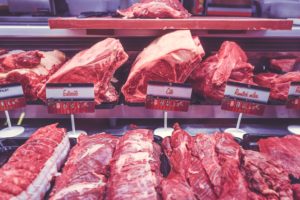
Photo by Lukas Budimaier on Unsplash
All content on this site ©2018
Jennifer Rose
except where otherwise noted
by Jenny Rose | Mar 9, 2017 | A Flourishing Woman, Body, Food
This is a third post in a series in which I’ve questioned the relationship between American dietary standards and health and written about my own personal journey with diet. This week I’ll focus on some of the ideology embedded in diet and food production.
In my first post, I briefly mentioned vegan bullying. Because of the way we choose to eat, my partner and I spend some time in digital conversations about food. I’ve been amazed by the hostility and hatefulness directed towards people who choose to produce, harvest and/or eat meat.
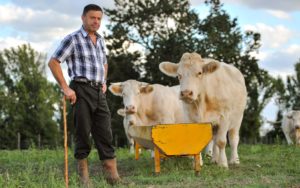
Photo by Agence Producteurs Locaux Damien Kühn on Unsplash
All people need to eat in order to live. That’s a given. I believe most individuals want to be able to feed themselves and their families with high-quality, healthy food. Sadly, because we live in a capitalist and consumer culture, this basic need is hugely impacted by financial, political, social and geographical variables. Additionally, diet is inextricably entwined in the religious and spiritual framework of many people.
Just this short list of factors make the basic necessity of putting food in our mouths complicated. Obesity and other eating disorders, as well as food-related diseases and health issues (which may be to say all diseases and health issues) reflect that.
Add to that a small but vocal group of people who take it upon themselves to judge, criticize, bully, shame and threaten others about their diet, and we’ve got a mess.
Now, there are all kinds of stated reasons why some people think they have a right to mandate what and how we all should eat. Some folks claim to be animal rights activists. Some talk about guilt, as in “What do you do about your guilt about eating the flesh of a dead animal?” Others say cows are killing the planet.
The list goes on. You get the idea.
I’m not a science teacher and this blog is not about handing out an academic education, but the cows killing the planet thing belongs under the heading of alternative facts. It simply isn’t true, and a brief survey of science-based permaculture, climate change and basic biologic history demonstrates that. Properly managed, the presence of animals is essential to healing the planet. Believe it or don’t believe it, but for me this is nonsense and I’m not interested in debating it.
The animal rights activism excuse really gets under my skin. First of all, equating eating meat with hating animals is first grade level reasoning. The world is filled with hunters who deeply respect and love the land and the animals they hunt and harvest. They show that respect by protecting the health of wildlife and wild land, doing their best to get a clean and efficient kill shot, using all of the animal they kill and supporting sustainable hunting practices. Of course, there are plenty of the other kind out there, lots of idiot trophy hunters and poachers who need a rack or a pelt in order to feel powerful. I don’t deny it. What I do say is that hunters are like everyone else — some are respectful and see themselves as part of the system we inhabit, and others operate strictly from power-over and see themselves as masters of the universe.
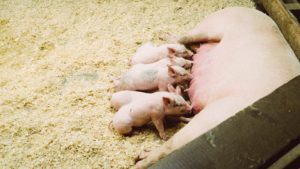
Photo by Greg Ortega on Unsplash
This also holds true for food producers. A small family farm hand raising meat with love, affection, attention, rotational grazing on healthy land and a good natural diet is a beautiful place. These people love their animals and the land. They also slaughter, butcher and eat their animals. They participate in, understand and respect every part of the cycle, from breeding to table.
To equate something like that with the nightmare of some modern mass meat production is simply ridiculous. If you want to see cruelty to animals, all you have to do is whisper “profit” into the ear of a corporation. Big Oil, the cosmetic industry and the fashion industry are just a short list of entities who have done plenty to destroy animals and habitat, and most people don’t care.
Incidentally, I’ve spent much of my life involved with animal rescue. I’m proud to say my mother is one of the most talented people I’ve ever met or heard of with animals and she’s largely given her life to making the world a better place for them, particularly horses and dogs, but by no means exclusively. This has all been volunteer work, done out of respect and love for the life in the world that can’t fight or speak for itself. She doesn’t see herself as better than. She sees herself as part of. The animals honor her with their presence and companionship, not the other way around.
So, yes, I eat meat with great enjoyment, AND yes, I love animals. I’m not limited by an inability to dwell in the sacred and powerful duality of life and death.
Bigger than all of this, however, is the guilt aspect, the real heart of this post. A vegan asks, “What do you do with your guilt about eating dead animals?”
For me, this question is much bigger than an issue of diet. The question reflects just how far we’ve strayed from wisdom, health and sanity in this culture.
When did we become amputated from our rightful place in the complex, miraculous web of life around us? What are the roots of the tragic and fatal arrogance that makes us believe we’re in control of life and death in our complex system? At what point did we become estranged from aging, loss, death and decay, which is to say HALF the full, powerful cycle of life?
Life is death. Death is life. Neither has meaning without the other. Both are essential. All life feeds on death. When we walk in the forest we’re walking on death. The whole natural world is based on prey and predator, eaten and eater. What does a tree do about its guilt as it feeds off and roots in the bodies of its companions? What does an eagle do with its guilt when it takes a salmon? What does a lion do with its guilt when it runs down a gazelle?
The guilt in that question is a projection. I don’t have any guilt about eating meat, and I think it’s tragic that anyone has guilt about the necessity to eat. If you pull up a carrot and eat it, you kill it. Every bite of food we put in our mouths is possible because of death. We exist as part of a vital, dynamic and inestimably beautiful and precious system that ebbs and flows, dances, fluctuates, cycles and revolves around life and death. We can choose to act as a unique and valuable part of that system by using only what we need, nurturing and learning from the life around us, and joyfully participating in all the ongoing life-death-life-death cycles around and within us, or we can choose to deny, destroy, and/or desperately try to control life and death, which is a completely fruitless (no pun intended) endeavor. We, thank God, are not that powerful.
The seasons will cycle. New life will be born in the midst of death. The green world will reseed itself, sprout, grow, bloom, fruit and die. The microscopic world and fungi will continue to break death into a rich placenta that sustains the next generation of life. Life is an incredible privilege. Death is part of that privilege. Nurturing life and allowing to die what must is part of what it means to me to be a woman.
I don’t know what’s going to happen to my country, the climate, or the planet. I’m afraid for us all, and the world we call home. What I do count on is the mighty cycle of life and death. All things change. All things move and flow. Nothing ever stays the same. All our fear and desperation, our greed and selfishness can’t change life and death.
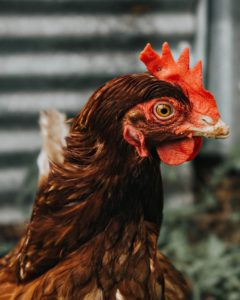
Photo by Andrea Tummons on Unsplash
What I can do is figure out how to best support my body with food. Then, I can make choices about how I procure the food I eat — to some degree. I don’t have the means right now to grow my own meat. However, I can and do buy eggs from a neighbor farmer, driving very carefully into the yard so as not to run over her free-range chickens and ducks. I can take the time to relish and appreciate opening a many-times recycled egg carton and looking at a whole variety of shaped, sized and colored eggs, mixed with occasional bits of straw and feather fluff. I can save money so I can buy a half an animal in the fall from a local small farmer to put in the freezer. I can buy fresh local yogurt, butter, cream and cheese from the farmer’s market.
It seems to me our energy should be going into making sure everyone has adequate food and clean water, and that we treat our food sources, whether animal or plant, and the system within which they grow (you know, the planet? Earth?) with love, intelligence and respect. We all can do something about food. Those among us who are doing the hard and unprofitable (financially) work of growing food on small farms may well hold the keys to our future survival. What they know about permaculture, holistic environments, food forests, sustainability, breeding, planting, harvesting and slaughtering is truly the wisdom of life.
Which is to say the wisdom of death.
Which is to say, again, the wisdom of life.
Bon appetit.
See the fourth post in this series here. Check my Resources page for links to information about diet and nutrition.
All content on this site ©2017
Jennifer Rose
except where otherwise noted
by Jenny Rose | Mar 2, 2017 | A Flourishing Woman, Body, Food
Last week I considered several questions about the politics of food. This week I want to share a reluctant personal journey.
Before going further, I want to clarify I’m not a dietician, a nutritionist, a doctor, or qualified to give any kind of diet or medical advice, nor am I interested in doing so. I am, however, the number one expert on my life and my body.
Until the last three or four years, it never occurred to me to be baffled about why eating by all the latest advice and rules hasn’t helped me with chronic pain and some of the other issues I listed in the first post on this topic. My whole life was like that. I’ve always felt I played by all the rules and things didn’t work well in any arena. Eating well and not feeling well didn’t exactly stand out. I assumed it was because I’m broken and flawed.
On the other hand, I know from my years of medical transcription work many people out there try desperately hard to adhere to their healthcare team’s recommendations in regard to diet, exercise and medication, but they still struggle with obesity, diabetes, heart disease, pain and mental illness, to name but a few. There are cheaters, of course, but most of those patients freely confess they’re noncompliant. Are all these compliant patients, and I assume hundreds of thousands of others like them, as broken and flawed as I am?

Photo by Stefano Pollio on Unsplash
And what about the frequent headlines regarding young, fit, athletic, active people, including vegans and vegetarians, having heart attacks and/or dropping dead? This week it was the ‘Biggest Loser’ host and trainer, Bob Harper. According to all official guidelines, those folks should live to 100, right?
So, I ask again, what the hell is going on here?
I realize now I’m not broken and flawed, at least not more than anyone else. The problem has simply been my diet. It’s always been my diet. Eating the way we’re all supposed to eat has not, does not, and I’m convinced will not ever work for me.
Three years ago, I was introduced to the idea of a ketogenic diet. It’s gradually become more and more present in the popular press, but I’d never really heard about it. I didn’t think I had a problem with gluten, and my own homemade bread formed an enormous part of my daily intake, so low-carb eating had no appeal. The other half of ketogenic was even less appealing — eating meat and animal fat. I hated feeling worn out, used up and too skinny, but I didn’t want to be fat. Eating high fat is bad for you — everyone knows that. I’d never eaten a lot of meat and didn’t feel I had the money to start. I’ve never had a great appetite, though strangely, I was usually snacking, but meat wasn’t that appealing. When I wanted a snack, I wanted a thick slice of homemade toast with margarine and a cup of tea with honey.
I formed a relationship with a ketogenic eater, who I thought was frankly boring about diet. He was a converted vegetarian and believed his plant-based diet had given him a near-fatal heart attack. On the other hand, he was (is) smart and had done a lot of research, which I respected. Unwillingly, but curious in spite of myself, I began to look at some of the information he shared.
At the time, I was hypothyroid, on medication; suffered from constipation, insomnia, and my usual mild-to-moderate mix of anxiety and depression. All of that was a cake walk, though, compared to my problems with muscle spasm and back pain.
For most of my adult life I’ve had pain problems. At one time, I was diagnosed with fibromyalgia, but I refused treatment, which consisted of pharmacology. I had frequent spasm in my neck, shoulders, back and hips, at least every couple of months, lasting for several days. The spasm at times made it impossible for me to sit at my desk and work, drive, and sometimes even shower. Triggers would be things like putting my foot up on the edge of the tub to put lotion on my leg, or sneezing. I walked every day, danced when I was able, worked in my garden and generally was active, but if I did any kind of exercise routine or repetitive motion I was sure to get into trouble. I couldn’t do yoga without dire consequences.
It was truly miserable, and I’d tried every modality I could think of over the years. Nothing gave me more than short-term relief. I had no hope of ever solving the problem, or even understanding what the problem was.
I knew low-carb, high-fat couldn’t possibly be the answer, because it’s not the well-rounded, well-balanced, high-fiber healthy eating I knew we need to do to stay well. I didn’t want to give myself heart disease or cancer on top of everything else. On the other hand, my friend claimed to have cured his heart disease eating keto, and he had the blood work, strength and endurance to prove it.
Huh.
So I read. I read about the biochemistry of inflammation, the essential biochemical role of cholesterol in our bodies, and early studies on cholesterol and its supposed link to heart disease. I read about saturated fat. I read about studies of indigenous people and dentistry. I also read criticisms and counter-arguments to most of those studies. I read about cherry-picking data and bias. I read studies and data paid for by the sugar industry, the beef industry, the dairy industry, Big Pharma and Big Ag.
My conclusion is that it’s difficult and time consuming to get reliable scientific data that’s unbiased about food. There’s “evidence” for just about every diet being The Right Way To Eat.
Then I started reading blogs and articles written by real people who are trying to get and stay healthy and understand what their bodies need. They’re not selling anything. They’re not trying to tell everyone else what to do. They’re living in their bodies, just like me.
During all these months of research and reading, a few things really stood out. Eating keto has a profound effect on diabetes, inflammation and a host of other maladies, and there’s plenty of science to back it up. I found whole communities of people healing themselves, learning together and exchanging information about what works in their bodies, many of whom have literally transformed their health with a zero-carb diet.
Keto diet is not mainstream. It doesn’t incorporate the food pyramid. Most doctors don’t recommend it.
Does that make it invalid or (even more ridiculously) morally or ethically wrong?
In the meantime, I moved to Maine and started living with my low-carb, high-fat eating guy. Gradually, I began to eat more like him.
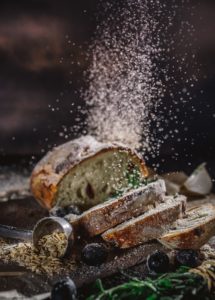
Photo by Helena Yankovska on Unsplash
I fought it every step of the way. I was like a bag of weasels when I gave up my morning (and midmorning and afternoon) tea with honey. What was tea without honey? I craved bread, homemade oatmeal, homemade scones and homemade gingersnap cookies. I was afraid to eat real butter. I decided this nonsense about vegetables and fruit was just that — nonsense, and I retained those in my diet, but I gave up bread and all grains. No flour. No rice. Goodbye amaranth, quinoa, cornmeal. No more homemade pancakes and waffles. No more buttered popcorn. I ask you, what is life without buttered popcorn?
I was feeling better. In fact, I noted I hadn’t had a back spasm since moving to Maine, an unheard-of period of time. I was also sleeping better. I had less bloating, water retention and gas.
I was disconcerted to find that I need to eat a lot. Much more than my male partner. It’s embarrassing. I discovered I had a lot of unconscious rules about Appropriate Eating For Women. I stopped worrying about keeping weight on and waited to get fat. I was eating more than I ever had before, and most of my calories were coming from animal fat.
I continued to feel better. I didn’t get fat. I’d read that fat doesn’t make you fat; carbs make you fat. I began to believe it. I felt healthy and strong and my weight was perfect. It stopped swinging up and down. I wasn’t cold all the time any more. I had more energy. My carb cravings stopped. I didn’t snack anymore. I got up, ate four or five eggs scrambled in butter on a bed of fresh spinach for breakfast, along with several strips of bacon and some fresh fruit, and then I started my day and didn’t even think about food until sometime in the afternoon, at which point I ate a ½ plus pound burger, mixed 70/30 with fat. Just the burger, mind you. Well, maybe a piece of cheese melted on top. When we were in funds, I ate a ¾ pound ribeye with lots of delicious fat.
Usually we are not in funds, however, and one day I ran out of spinach and fresh fruit at the same time. For a few days, there were only bacon and eggs for breakfast. Then we got a paycheck and I happily went and bought spinach and tangerines again.
Guess what?
Pain.
Not spasm, but pain in all the old places — hip, low back and neck. I ached. I was stiff. I couldn’t sleep.
I was furious. I was scared. People HAVE to eat vegetables to stay healthy. They’re essential. I love fresh fruit.
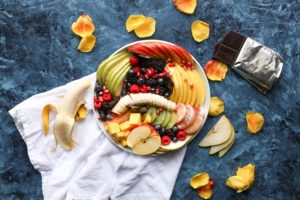
Photo by Brenda Godinez on Unsplash
I was not going to give up fresh fruit!
Eventually, I gave up both vegetables and fruit.
As of this writing, I no longer take vitamin or herbal supplements, with the exception of magnesium, one a day, and a melatonin at bedtime. I take no prescription meds. I drink lots of water and unsweetened tea, mostly herbal and green. I’m no longer hypothyroid, proven by blood test. I’m almost never cold. I still struggle with eating enough, but if I eat more than a pound of meat a day (not counting eggs and butter), I don’t get faint or hypoglycemic. My migraines are less frequent. My weight is dead steady. I have no trouble at all with my digestion. My BMI is perfect. As long as I eat enough, I have loads of energy. I stretch, dance, swim, walk, shovel snow and lift weights with no problems. I’m not short of breath. I sleep like a rock but rarely need to nap during the day.
I haven’t had a muscle spasm now for more than two years. I haven’t had a cold or a sinus infection. My nails are supple and strong. My hair is curly and wild and thick. My skin is great.
I’ve never felt so good, and I’ve never been so healthy.
I’ve broken most rules of mainstream “healthy” eating.
Go figure.
This discussion of diet continues here and here. Please see my Resources page for links to diet and nutrition information.
All content on this site ©2017
Jennifer Rose
except where otherwise noted
by Jenny Rose | Feb 23, 2017 | A Flourishing Woman, Body, Food
I recently read a blog post about vegan bullying.
Yep. You read that right. Vegan bullying is a thing.
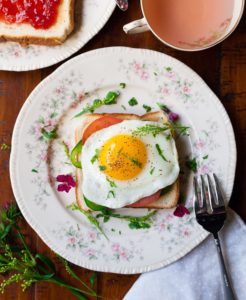
Photo by Joseph Gonzalez on Unsplash
It’s time for me to write about food.
I grew up in the 60s and 70s in a middle-class family with the standard education about the food pyramid, Food Commandments from the ADA, and a mother who was very concerned and conscientious about feeding her children and animals in the best possible way. Remember Adele Davis?
In my adult life, I was never a vegan or even a vegetarian, but I did eat mostly fruit, grain and vegetables. I bought organic whenever possible. I took supplements. I baked my own bread and desserts, made my own granola, and cooked gallons of stews, soups, chili and hot cereal over the years in my crock pot for my family.
Thanks to my mom’s good sense, my lack of a sweet tooth, and my income level, soda, fast food, candy, donuts and other mass produced sweets have never been a large part of my food intake.
All my life, I’ve sincerely believed I’ve had a healthy, well balanced diet. I avoided white sugar, high-fat and junk food. I made smoothies with low-fat unsweetened yogurt. I grew my own vegetables and herbs. I’ve never been overweight. In fact, I’ve had trouble keeping weight on.
I have a family and/or personal history of rheumatoid arthritis; inflammatory bowel disease; fibromyalgia; constipation; poor circulation; restless leg syndrome; migraines; gout; chronic pain; chronic fatigue; muscle spasm; insomnia; depression; anxiety; asthma; skin and sinus problems; food, environmental and drug allergies; and hypothyroidism.
It’s interesting to note how much of this list has to do with inflammation.
The list is kind of daunting written out like that, but members of my family rarely go to the doctor or take any kind of medication. None of us are overweight. Mom and I don’t drink alcohol or smoke. A lot of the above diagnoses are nebulous and chronic rather than acute. We take vitamins, exercise, try to eat well and control our stress, and do our best with the constant presence of chronic pain and discomfort. Conventional medicine can’t do much for most of this list except prescribe pain meds, anti-depressants, anti-inflammatories, antihistamines and anti-anxiolytics.
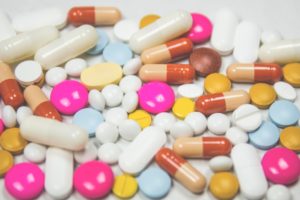
Photo by freestocks.org on Unsplash
Stepping back and considering our current social context in America, we have millions of people suffering from obesity, diabetes, heart disease and a dozen addictions, not the least of which is the current exploding opioid dependence. Millions and millions of people are suffering with increasing anxiety and other mental health challenges, exacerbated by the current political and social climate. Weight loss programs, supplements, books and weight gurus make billions of dollars a year. We’re obsessed with food and our relationship to it.
Food production is complicated and often unethical, to say the least. Monocropping practices by Big Agriculture annihilate the land, destroying the delicate, complex web of plants, soil organisms, animals and insects. We’re exposed to artificial fertilizers, insecticides and other poisons, whether we use them or not.
Commercial animal food production practices have frequently been horrifically inhuman and unhealthy, both for the animals and for consumers.
Healthcare, to put it kindly, is in disarray. As a medical transcriptionist, I routinely transcribe medication lists that contain twelve or more prescription drugs. Exponential pharmaceutical costs are in the headlines. I myself have insurance, for the moment, through Obamacare, but it’s useless. The only insurance I can afford has a $5,000 deductible. I couldn’t deal with a $500 deductible. I never see a doctor unless it’s a dire emergency, and then I always have to fill out indigent care paperwork to get a sliding scale fee.
Adding to the confusion is the ever-present influence of money. Advertising. Food stamps. Fast food. Dating. Meeting friends for a drink or at the coffee shop. We struggle to feed our families. We debate about vending machines in schools and school lunches. We deal with food-borne illnesses. We have no money and live on beer and ramen noodles, or oatmeal, or rice and beans. We know from advertising the right food can make us beautiful, make us strong, cure our ills, provide us with happy relationships, better hair, younger and more attractive bodies, a perfect date. We should eat beef. We should eat gluten free. We should eat organic. We should eat a pizza. We should eat vegetarian. We should drink milk. We know how to eat well, but we can’t afford to. We know how to eat well, but the rest of our family won’t cooperate. We know how to eat well, but we don’t have time.
Yet all life must eat. A living body is a complex system of energy, organs, elements and chemistry, and we know a lot about how the complex system of the human body works. If we don’t feed our body well, it gets sick.
We all think we know what it means to eat well, based on learned information, our experience within our own bodies, our observations of others, and in some cases our spiritual and political beliefs. Of course, it’s hard to think clearly when in the grip of an addiction to sugar and carbs (this includes alcohol), but that counts only if we acknowledge our addiction and its power to drive our behavior, right?
We all know what a good diet is. Everyone knows. It’s merely a question of self-discipline.
If only it was that simple.
In fact, everyone doesn’t necessarily know what a good diet is, for themselves or anyone else. There’s a lot of confusion, a lot of disagreement, a lot of conflicting “science” and advice. There are a lot of social, financial and political agendas, a lot of manipulation and brainwashing, a lot of misleading and frankly false “information.”
Why is one of the most basic activities of life so complicated? Why is there so much conflicting “information?” Why are we so unhealthy? Why are we so dependent on Big Pharma? Why are people in their late 20s having heart attacks and strokes? Why is there an obesity epidemic? Why is diabetes on the rise?
When did we get to the point of vegan bullying, or any kind of food bullying, for that matter?
Finally, lest we Americans forget there are people outside America, how is it possible that famine still exists in the world when so much food is wasted and discarded every day? What social and political dynamics allow people to starve to death in Africa or anywhere else, while other populations suffer malnourishment and metabolic starvation encased in obesity?
Lastly, why is the topic of diet so inflammatory? Why do vegans and vegetarians bully meat eaters? Why is eating meat conflated with gun rights, hatred and cruelty? Why is it unacceptable to challenge our current belief systems around food?
Hard questions without simple answers. Hard questions guaranteed to outrage lot of people.
Why?
This topic to be continued here, here. and here.
Please see my Resources page for more information on food, diet, nutrition and health.

Photo by Jonathan Simcoe on Unsplash
All content on this site ©2017
Jennifer Rose
except where otherwise noted

















